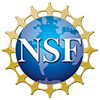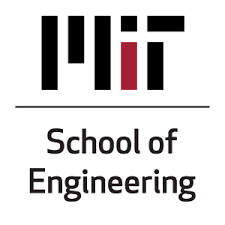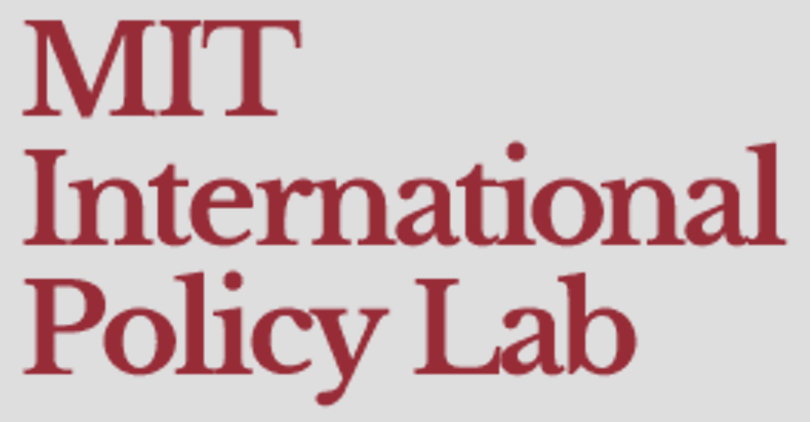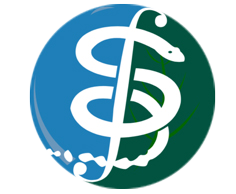 The National Science Foundation (NSF) is a United States government agency that supports fundamental research and education in all the non-medical fields of science and engineering. NSF is an independent federal agency created by the US Congress in 1950 "to promote the progress of science; to advance the national health, prosperity, and welfare.."
The National Science Foundation (NSF) is a United States government agency that supports fundamental research and education in all the non-medical fields of science and engineering. NSF is an independent federal agency created by the US Congress in 1950 "to promote the progress of science; to advance the national health, prosperity, and welfare.."
The Burroughs Wellcome Fund (BWF) is an independent private foundation dedicated to advancing the biomedical sciences by supporting research and other scientific and educational activities. Within this broad mission, BWF has two primary goals: 1) To help scientists early in their careers develop as independent investigators; and 2) To advance fields in the basic biomedical sciences that are undervalued or in need of particular encouragement. BWF was founded in 1955 as the corporate foundation of the pharmaceutical firm Burroughs Wellcome Co. In 1993, a generous gift from the Wellcome Trust in the United Kingdom, enabled BWF to become fully independent from the company, which was acquired by Glaxo in 1995. BWF has no affiliation with any corporation.
 The MIT School of Engineering's (SoE) mission is to educate the next generation of engineering leaders, to create new knowledge, and to serve society. The MIT SoE strives to attract the most talented people in the world: to create, to innovate, and to see the unseen. The largest of MIT’s five schools, the School of Engineering comprises about 70 percent of MIT’s undergraduates and 45 percent of graduate students. The MIT SoE's kind of engineer views praise as an invitation to tackle the next problem — and the harder, the better. The focus is on the kind of innovation that can take decades, with deep technology and science-based engineering at its core.
The MIT School of Engineering's (SoE) mission is to educate the next generation of engineering leaders, to create new knowledge, and to serve society. The MIT SoE strives to attract the most talented people in the world: to create, to innovate, and to see the unseen. The largest of MIT’s five schools, the School of Engineering comprises about 70 percent of MIT’s undergraduates and 45 percent of graduate students. The MIT SoE's kind of engineer views praise as an invitation to tackle the next problem — and the harder, the better. The focus is on the kind of innovation that can take decades, with deep technology and science-based engineering at its core.
 Wellcome exists to improve health by helping great ideas to thrive. The Wellcome Trust takes on big health challenges, campaign for better science, and help everyone get involved with science and health research. It supports exploring fundamental questions about health and disease. Its founder, Sir Henry Wellcome, was a medical entrepreneur, collector and philanthropist and the activities of the Trust today reflect the breadth of his interests, and his conviction that health can be improved when research generates, tests and investigates new ideas. One of the world’s biggest challenges the Wellcome takes on is how to be better prepared for the next major epidemic. Wellcome’s response is an example of how to work with academia, philanthropy, businesses, governments and civil society around the world to take on health challenges in many different, coordinated ways.
Wellcome exists to improve health by helping great ideas to thrive. The Wellcome Trust takes on big health challenges, campaign for better science, and help everyone get involved with science and health research. It supports exploring fundamental questions about health and disease. Its founder, Sir Henry Wellcome, was a medical entrepreneur, collector and philanthropist and the activities of the Trust today reflect the breadth of his interests, and his conviction that health can be improved when research generates, tests and investigates new ideas. One of the world’s biggest challenges the Wellcome takes on is how to be better prepared for the next major epidemic. Wellcome’s response is an example of how to work with academia, philanthropy, businesses, governments and civil society around the world to take on health challenges in many different, coordinated ways.
 The MIT International Science & Technology Initiatives (MISTI) program's mission is to empower MIT students and faculty to advance knowledge and solve the world’s great challenges by connecting them with researchers, companies, and other partners around the world. Specifically, MISTI's goals include to: Further MIT’s educational objectives by creating applied international learning opportunities for MIT students that increase their ability to understand and address real-world problems; Partners with companies, universities, research institutions, non-profit organizations, and government entities, especially those that serve as hosts and collaborators for our students and faculty, to address shared challenges.
The MIT International Science & Technology Initiatives (MISTI) program's mission is to empower MIT students and faculty to advance knowledge and solve the world’s great challenges by connecting them with researchers, companies, and other partners around the world. Specifically, MISTI's goals include to: Further MIT’s educational objectives by creating applied international learning opportunities for MIT students that increase their ability to understand and address real-world problems; Partners with companies, universities, research institutions, non-profit organizations, and government entities, especially those that serve as hosts and collaborators for our students and faculty, to address shared challenges.
 The MIT Department of Civil and Environmental Engineering's (CEE) intellectual focus is discovery and innovation to understand the world, invent and lead with creative design to sustain life and society in ever-changing environments. Emphasizing the use of quantitative approaches, CEE features two vibrant centers of gravity: environment, what exists as natural systems; and infrastructure, what is created by human activity.
The MIT Department of Civil and Environmental Engineering's (CEE) intellectual focus is discovery and innovation to understand the world, invent and lead with creative design to sustain life and society in ever-changing environments. Emphasizing the use of quantitative approaches, CEE features two vibrant centers of gravity: environment, what exists as natural systems; and infrastructure, what is created by human activity.
 The Centre for Applied Mathematics in Bioscience and Medicine (CAMBAM) is a leading institution in the application of mathematics to address challenges in bioscience and medicine through partnership with industry, government and other stakeholders in society. CAMBAM meets its objectives by promoting and fostering research, teaching and training in applications of quantitative biology at all levels ranging from the molecular/genetic through single cell and whole organ physiology and biology to population dynamics and broader ecological questions, on time scales from the present to the evolutionary; honing the talents of students at all levels through unique training opportunities in academic and non-academic settings; and conducting applied research of the highest scientific rigor, meeting existent industry and societal demands in clinical and public health settings.
The Centre for Applied Mathematics in Bioscience and Medicine (CAMBAM) is a leading institution in the application of mathematics to address challenges in bioscience and medicine through partnership with industry, government and other stakeholders in society. CAMBAM meets its objectives by promoting and fostering research, teaching and training in applications of quantitative biology at all levels ranging from the molecular/genetic through single cell and whole organ physiology and biology to population dynamics and broader ecological questions, on time scales from the present to the evolutionary; honing the talents of students at all levels through unique training opportunities in academic and non-academic settings; and conducting applied research of the highest scientific rigor, meeting existent industry and societal demands in clinical and public health settings.
 The mission of the MIT International Policy Lab (IPL) is to develop and enhance connections between MIT research and public policy, in order to best serve the nation and the world in the 21st century. The IPL is involved in identifying policy-relevant research, creating and implementing outreach strategies to engage relevant policymakers and other stakeholders in dialogue, and creating the conditions and providing training to make engagement effective, for the benefit of all stakeholders, involved.
The mission of the MIT International Policy Lab (IPL) is to develop and enhance connections between MIT research and public policy, in order to best serve the nation and the world in the 21st century. The IPL is involved in identifying policy-relevant research, creating and implementing outreach strategies to engage relevant policymakers and other stakeholders in dialogue, and creating the conditions and providing training to make engagement effective, for the benefit of all stakeholders, involved.
 The National Center for Scientific Research, or CNRS. The CNRS is a public organization under the oversight of the French Ministry of Education and Research. Founded in 1939 by governmental decree, the CNRS's aims include to: Evaluate and carry out all research capable of advancing knowledge and bringing social, cultural, and economic benefits for society; Contribute to the promotion and application of research results; Develop scientific information; Support research training.
The National Center for Scientific Research, or CNRS. The CNRS is a public organization under the oversight of the French Ministry of Education and Research. Founded in 1939 by governmental decree, the CNRS's aims include to: Evaluate and carry out all research capable of advancing knowledge and bringing social, cultural, and economic benefits for society; Contribute to the promotion and application of research results; Develop scientific information; Support research training.
 Fluids (ISSN 2311-5521) is an open access journal, which provides an advanced forum for studies on fluid dynamic theory and its applications, and fluid simulation, modeling and experimentation in chemical, physical and biological processes. The Journal's goal is to improve fast dissemination of new research results and ideas, and to allow research groups to build new studies, innovations and knowledge in Fluid Dynamics without delay.
Fluids (ISSN 2311-5521) is an open access journal, which provides an advanced forum for studies on fluid dynamic theory and its applications, and fluid simulation, modeling and experimentation in chemical, physical and biological processes. The Journal's goal is to improve fast dissemination of new research results and ideas, and to allow research groups to build new studies, innovations and knowledge in Fluid Dynamics without delay.

The support of Mr. Paul Tse and the Tse Cheuk Ng Tai Innovation Fund will make possible the awards for best submissions by students and junior researchers, in the form of the Tse Cheuk Ng Tai Innovations in Fluids and Health 2019 Awards.









 Follow us on
Follow us on